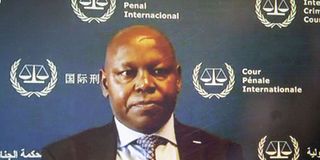Lawyer Paul Gicheru set for ICC pretrial hearing

Kenyan lawyer Paul Gicheru makes his first appearance before the ICC on November 6, 2020, before Judge Reine Adélaïde Sophie Alapini-Gansou of Pre-Trial Chamber A.
What you need to know:
- Trial judge Miatta Maria Samba yesterday said the status conference will be held on September 17.
- Judge Samba also directed the parties to inform court on the agreed facts of the case -- evidence that is not contested.
The International Criminal Court is scheduled to conduct a pretrial hearing for the case facing Kenyan lawyer Paul Gicheru, setting the stage for the trial whose outcome will have a bearing on the collapsed case of Deputy President William Ruto.
Trial judge Miatta Maria Samba yesterday said the status conference will be held on September 17 and directed parties -- Mr Gicheru's defence team and the Office of the Prosecutor -- to file their written arguments by September 10.
To facilitate the preparation of the status conference and to enable the Trial Chamber to set the date for commencement of the trial, the judge directed the prosecution to provide information on the evidence it anticipates to table against Mr Gicheru.
The information should contain the estimated number of witnesses to be called and number of hours of in-court testimony and whether the prosecutors will use expert witnesses.
The Office of the Prosecutor will also inform court on testimony provided by audio or video links and the estimated volume of documentary or other non-testimonial evidence to be relied upon at trial.
In addition, the prosecution will inform court on whether it will use prior recorded testimonies, such as written statements and transcripts of recorded interviews with witnesses, in addition to or instead of testimony in court.
New evidence
Admission of such evidence is allowed and is governed by Rule 68 in the ICC Rules of Procedure and Evidence.
Judge Samba also directed the parties to inform court on the agreed facts of the case -- evidence that is not contested.
Further information sought by the court is on the translation at trial -- the language to be used during the trial, including languages expected to be used by the witnesses.
The parties have also been directed to inform court on disclosure of outstanding material in the prosecution’s possession and related issues such as whether the prosecution's investigations are still going on as well as the timing and volume of outstanding disclosure. The court also wants to know about protective measures for witnesses, including additional need for redaction of their statements, delayed disclosure, or referrals to the court’s witness protection programme.
Additionally, the court is interested on information regarding the disclosure of witness identities, which have not been disclosed to the defence yet.
According to the directives, the parties will also make their arguments on disclosure of materials obtained by the prosecutor on condition of confidentiality and solely for the purpose of generating new evidence.
Influencing witnesses
The defence is expected to provide information on whether it intends to advance a defence by raising a ground for excluding the accused from criminal responsibility.
Judge Samba has also sought provision of a trial brief by the prosecutor and the estimated length of opening statements.
Mr Gicheru is facing eight charges on offences against the administration of justice by corruptly influencing witnesses of the court.
In the event of conviction, the court may impose a term of imprisonment not exceeding five years or a fine, or both.
He is accused of offering Sh20.4 million in bribes to witnesses to withdraw from the case that was facing Deputy President Wiliam Ruto and radio presenter Joshua Sang.
Mr Gicheru, who is out on a Sh1 million bond, has already boosted his defence team with appointment of lawyer Suzana Tomanovic, an expert in international criminal law, from Bosnia and Herzegovina.





